This is the latest in our series of articles highlighting essential system tools. These are small utilities, useful for system administrators as well as regular users of Linux based systems. The series examines both graphical and text based open source utilities. For details of all tools in this series, please check the table in the summary section.
We’ve previously included neofetch in this series. Neofetch is a command-line interface system information script designed to capture information about your system and display it in an aesthetic and visually pleasing way. Given that neofetch’s last update was back in August 2020 and its developer has archived its GitHub repository, we’ve removed it from the Essential System Tools series.
We now include HyFetch in the series. HyFetch is a fork of neofetch that displays distro ASCII art in LGBTQ+ pride colours. This script displays information about your Linux system, such as the number of installed packages, OS and kernel version, active GTK theme, CPU info, and used/available memory. It’s written in Python and published under an open source license.
Installation
We tested HyFetch in Manjaro, an Arch-based Linux distribution. There’s a package in Manjaro’s Official Repositories which makes installation a simple affair. We’re installing HyFetch using Pamac, Manjaro’s Package Manager.
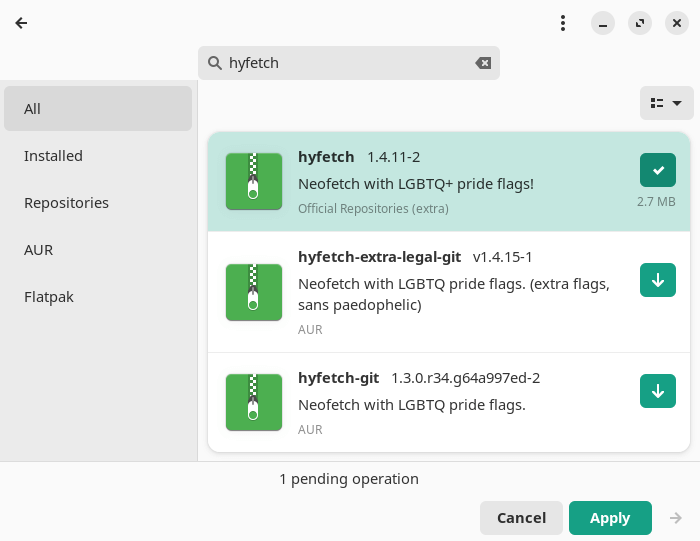
Configuration
After installation and running the program for the first time, we’re presented with a few configuration choices. First, we asked to choose a flag. The image shows some of the flag presets that are available. We went with the default option (rainbow).
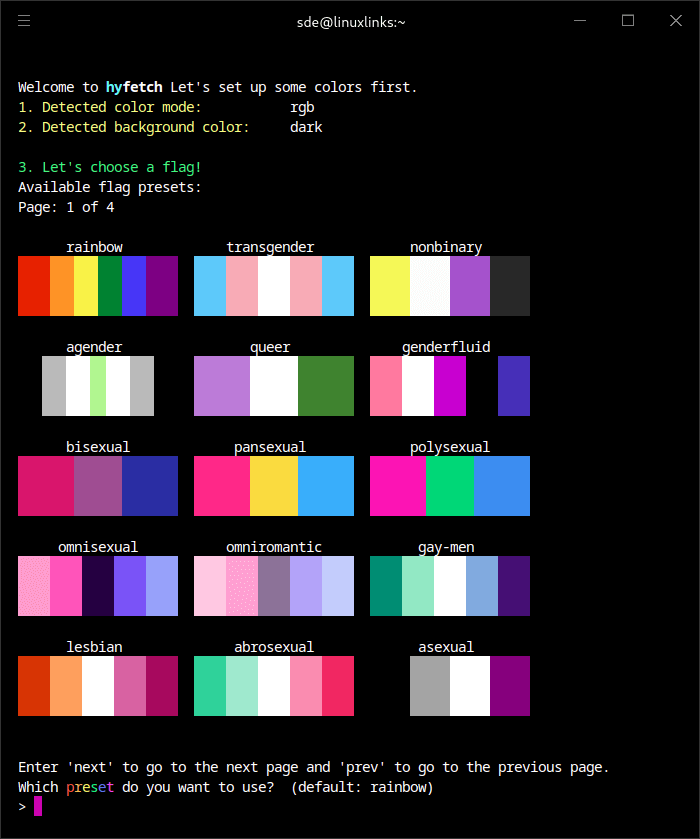
Next, chose the colour brightness.
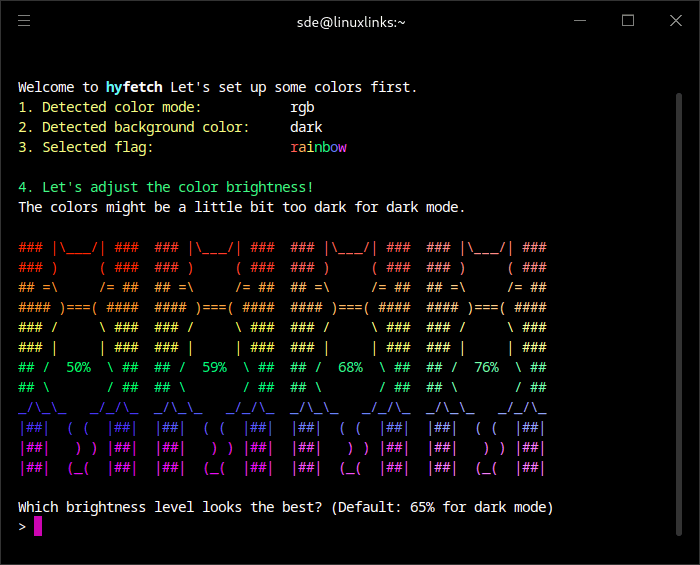
And now we can choose a colour arrangement.
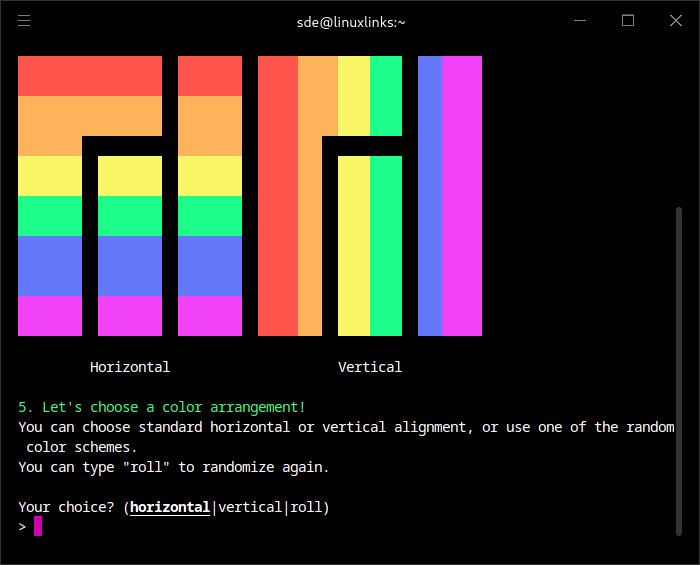
We’re now asked to save our configuration options.
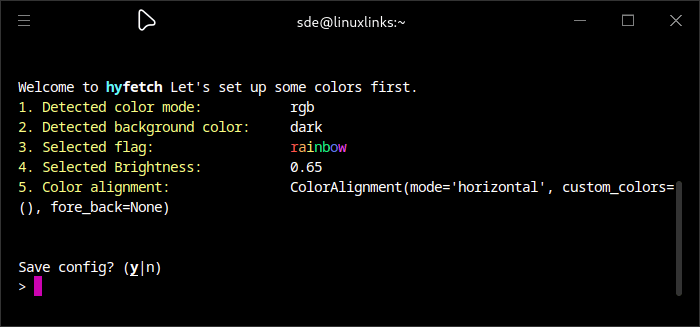
In action
Here’s the output of HyFetch with our chosen configuration.
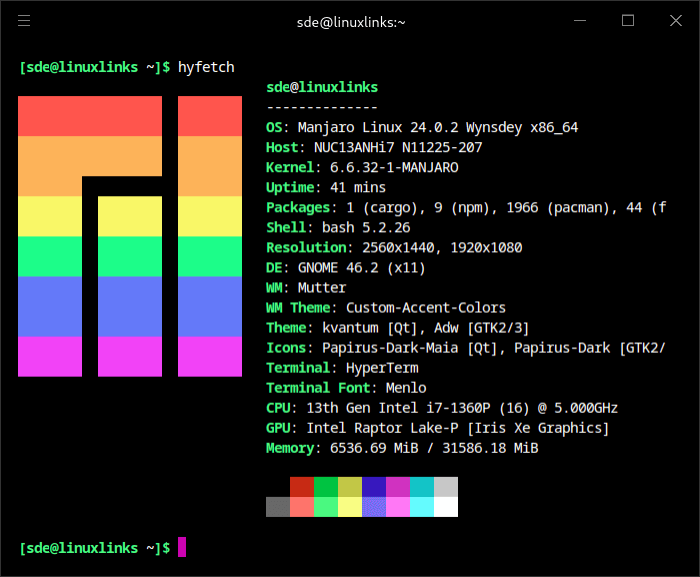
Summary
HyFetch is a very useful tool. It’s actively maintained and nicely fills the void left by neofetch.
Hyfetch also has the ability to integrate with other system info tools, such as fastfetch, to use them to gather info that is then displayed through hyfetch.
The image below shows the available options.
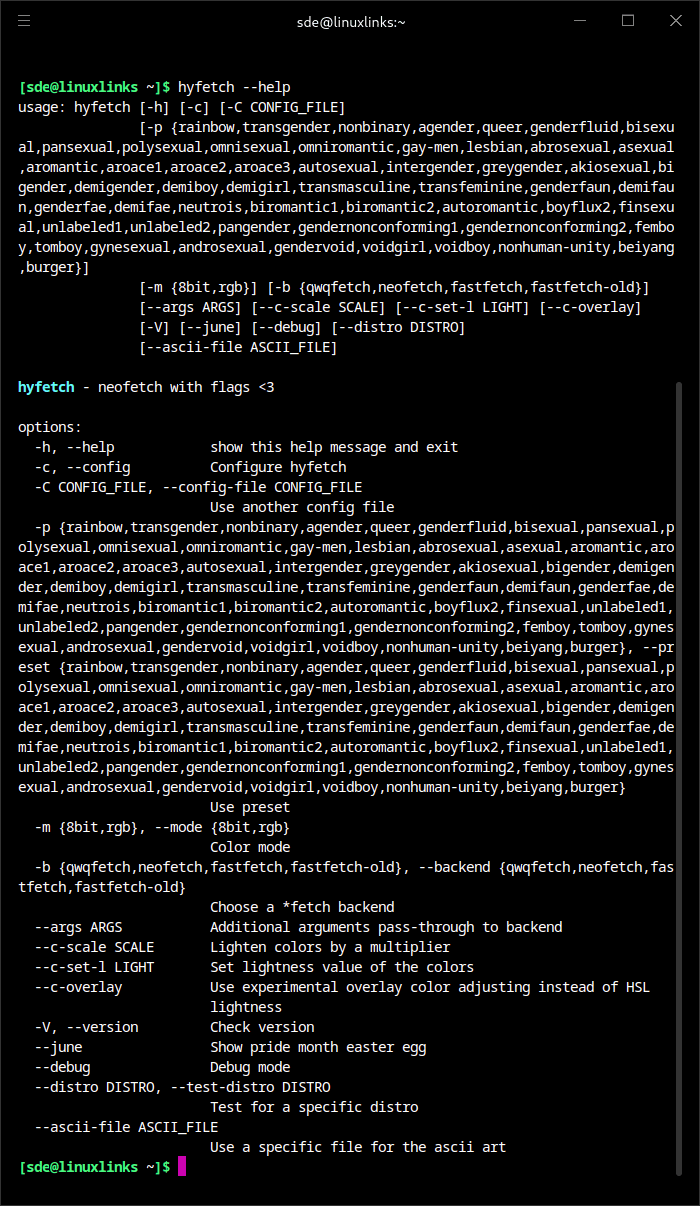
Website: github.com/hykilpikonna/hyfetch
Support:
Developer: Dylan Araps
License: MIT License
HyFetch is written in Python. Learn Python with our recommended free books and free tutorials.
All the essential tools in this series:
| Essential System Tools | |
|---|---|
| Alacritty | Innovative, hardware-accelerated terminal emulator |
| BleachBit | System cleaning software. Quick and easy way to service your computer |
| bottom | Process/system monitor for the terminal |
| btop++ | Monitor usage and stats for CPU, memory, disks, network and processes |
| catfish | Versatile file searching software |
| Clonezilla | Partition and disk cloning software |
| CPU-X | System profiler with both a GUI and text-based |
| Czkawka | Find duplicate files, big files, empty files, similar images, and much more |
| ddrescue | Data recovery tool, retrieving data from failing drives as safely as possible |
| dust | More intuitive version of du written in Rust |
| f3 | Detect and fix counterfeit flash storage |
| Fail2ban | Ban hosts that cause multiple authentication errors |
| fdupes | Find or delete duplicate files |
| Firejail | Restrict the running environment of untrusted applications |
| Glances | Cross-platform system monitoring tool written in Python |
| GParted | Resize, copy, and move partitions without data |
| GreenWithEnvy | NVIDIA graphics card utility |
| gtop | System monitoring dashboard |
| gWakeOnLAN | Turn machines on through Wake On LAN |
| hyperfine | Command-line benchmarking tool |
| HyFetch | System information tool written in Python |
| inxi | Command-line system information tool that's a time-saver for everyone |
| journalctl | Query and display messages from the journal |
| kmon | Manage Linux kernel modules with this text-based tool |
| Krusader | Advanced, twin-panel (commander-style) file manager |
| Nmap | Network security tool that builds a "map" of the network |
| nmon | Systems administrator, tuner, and benchmark tool |
| nnn | Portable terminal file manager that's amazingly frugal |
| pet | Simple command-line snippet manager |
| Pingnoo | Graphical representation for traceroute and ping output |
| ps_mem | Accurate reporting of software's memory consumption |
| SMC | Multi-featured system monitor written in Python |
| Timeshift | Reliable system restore tool |
| QDirStat | Qt-based directory statistics |
| QJournalctl | Graphical User Interface for systemd’s journalctl |
| TLP | Must-have tool for anyone running Linux on a notebook |
| Unison | Console and graphical file synchronization software |
| VeraCrypt | Strong disk encryption software |
| Ventoy | Create bootable USB drive for ISO, WIM, IMG, VHD(x), EFI files |
| WTF | Personal information dashboard for your terminal |


A really useful script
There’s also pridefetch, which is a Python script showing system stats with pride flags.
Well done for being a website that celebrates inclusion and diversity.